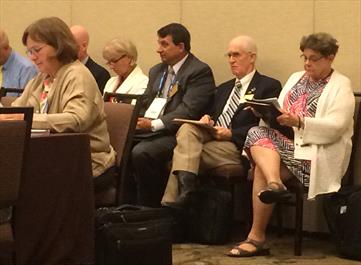
VIN News Service
Dr. Mary Beth Leininger, right, took notes last month as an AVMA House of Delegates reference committee debated for hours about whether a task force was necessary to evaluate how accreditation functions and its impact on the profession. The policymaking body ultimately vetoed all attempts to study or change how the Council on Education operates.
Dr. Mary Beth Leininger is returning to the Council on Education.
The American Veterinary Medical Association accrediting body voted to reinstate Leininger last week following a Board of Governors hearing on July 7. The three-member panel comprised of AVMA President Dr. Joe Kinnarney, his predecessor, Dr. Ted Cohn, and Dr. Chip Price, former chair of the AVMA Board of Directors, determined that Leininger had been kicked off the COE in March 2014 for what appeared to be “arbitrary or irrational” reasons.
Leininger, bound by confidentiality agreements, would not speak about details of her reinstatement except to say that she’s “happy” with the decision. As part of her reinstatement, she agreed to abstain from any COE decisions regarding foreign school accreditation.
“Do I feel vindicated? Yes,” she said. “I felt my dismissal was not just, and the Board of Governors agreed."
Leininger, a former AVMA president, will rejoin the COE for the remainder of her term, which expires in mid-2018. The council next meets in September.
Her troubles within the COE began in January 2014, when she stood before an AVMA House of Delegates reference committee in Chicago and expressed concerns that extending U.S. accreditation to foreign schools was stretching the resources of the 20-member volunteer body at the expense of its oversight of domestic education.
AVMA and COE officials fired back, first by requiring that Leininger remove herself from foreign accreditation decisions in order to remain on the council. But in March 2014, the COE voted to kick her off the council anyway, alleging that her opinions conflicted with her role in the accrediting agency.
That action fueled the firestorm already brewing about how accreditation operates in the United States, with veterinarians from all sides accusing the AVMA’s politically minded leadership of inappropriately influencing the COE, a supposedly independent body. At the dissension’s heart are concerns that the evaluating body bows to the AVMA’s self-imposed mission to accredit foreign schools and non-traditional domestic programs.
The grassroots challenge to upend the COE, described by some as the AVMA's "sacred cow,” has led to trouble with National Advisory Committee on Institutional Quality and Integrity, an 18-member U.S. Department of Education oversight panel charged with reviewing the COE’s job performance. Critics sent NACIQI more than 800 letters and testified during NACIQI hearings in December 2012 and in December 2014, alleging that the AVMA and COE operates more like an exclusive club than an agency charged with ensuring the quality of veterinary education.
Not lost on the NACIQI panel was Leininger’s dismissal, which came out when she testified about it. “For speaking out in front of the AVMA House of Delegates I was removed for perceived conflicts of interest,” Leininger stated. It also was revealed that former COE member Dr. Bill Kay, too, had been removed from his seat in 2007 for similar reasons. Though Kay never appealed, he rejected the decision.
News that the COE had removed two of its own after they had voiced concerns about the accrediting body didn’t sit well with NACIQI, which promptly ordered AVMA to reach out to critics and make several other changes before again appearing in front of the panel in July 2016.
Since then, AVMA and COE officials say they've “strengthened the firewall” between the two groups by allocating $10,000 to hire the COE its own legal counsel and no longer allowing the AVMA Board of Directors to participate in accreditation activities, namely COE meetings and college site visits. The COE selection committee also has been revamped, with positions once held by Board and House members replaced by at-large seats. And leaders have hosted a number of “listening sessions” where critics are permitted to express their concerns with how the COE operates.
In July, it seemed the tide turned in the COE’s favor when the House of Delegates rejected several resolutions aimed at changing how accreditation operates. The reason largely expressed is that after four years of infighting, leaders would like to move on to other topics.
That doesn’t mean a faction of the profession isn’t still disenchanted with the process and insists that more work must be done to ensure transparency and autonomy for the COE while refocusing the AVMA on its mission — serving members.
Amid such turmoil, Leininger remains optimistic. Her reinstatement, after all, is unprecedented.
“I’m still a little amazed at this outcome," she said. “The Board of Governors was quite straightforward and forthright about this process. They took my appeal hearing seriously. That, to me, is very encouraging."